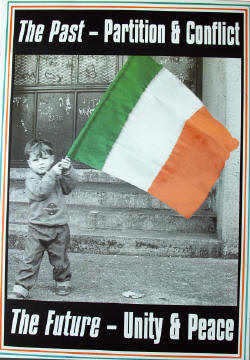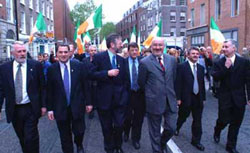 |
Irisch
Republikanische Solidarität
|
 |
PROTESTS MOUNTED AGAINST ELECTION CANCELLATION
* 'Cheer up', say Governments, Haass
The Irish and British governments have sought to put a positive
light on the recent breakdown in the peace process, despite the
British government's recent cancellation of elections in the
North of Ireland.
US envoy Richard Haass has also sought to lighten the mood amid
nationalist anger at the British government's departure from
democratic norms and the 1998 Good Friday peace Agreement.
British Prime Minister Tony Blair cancelled the elections in a
bid to protect Ulster Unionist leader David Trimble and the
nationalist SDLP from a decline in electoral support. The two
governments have insisted the political vacuum which has now
opened up can be filled by more talks.
"I see no reason whatsoever for people to be discouraged. We've
had a setback .. but this is not a crisis," Mr Haass insisted, on
a visit to Belfast this week.
But reports of a new round of talks have been dismissed by Sinn
Fein, who are organising protests against the British
government's cancellation of elections in the North of Ireland.
Republicans have called for a day of action on May 29 in cities
and towns across Ireland to protest against the cancellation of
the Belfast Assembly election.
This week's meeting between British Secretary of State Paul
Murphy and Irish Minister of Foreign Affairs Brian Cowan failed
to come up with a date for future elections. It emerged that "the
autumn" would be the "target" for elections.
A press conference following the meeting was dominated by Sunday
newspaper allegations about the alleged IRA informer
'Steak-Knife'.
Sinn Fein's Martin McGuinness described the meeting as "a
failure". He said suggestions of further talks were not a
serious attempt to fix current problems.
Mr McGuinness expressed anger "that the British government has
cancelled the elections, shut down the political institutions and
created a dangerous political vacuum".
"I think any suggestion that meetings will be held by the two
governments with the parties over the coming period is all
nonsense really," he said.
Mr McGuinness said "the autumn" could stretch from the end of
September right through to the end of December.
"This is a nonsensical approach. It is not going to resolve the
difficulties," he said.
"The messages that I need to hear and the people I represent need
to hear is that the leadership of the Ulster Unionist Party are
committing themselves to the full and faithful implementation of
the Good Friday Agreement.
"We need to see David Trimble take on the rejectionists in his
party.
"We need to see him face down Ian Paisley. Opinion polls do tell
us that whatever the feeling of the unionist voter at any
particular time there is certainly a view that two thirds of the
unionist community would like to see the peace process work.
"The big difficulty is that there is an analysis out there that
one third of the unionist community is for the agreement, one
third is against and another third of people have varying views.
"It is to that last third that unionist leadership has not given
leadership."
He pointed out that the process was "going nowhere" unless the
unionist leadership was prepared to "embrace and promote change
on this island".
Under the most recent legislation rushed through the British
parliament, the election could still be allowed to proceed at any
date this year. Mr McGuinness called on people to come out on 29
May and demand the right to vote.
Announcing details of an islandwide day of action, in over 30
cities and towns, to protest the cancellation of the May
elections and to call for the elections to go ahead in June, he
said:
"Next Thursday, 29 May, hundreds of thousands of people
throughout the Six Counties should be going to the polls to elect
108 Assembly members and a new cross party Executive," he said.
"Instead, the British government have cancelled the elections,
shut down the political institutions and created a dangerous
political vacuum.
"The cancelling of the elections is wrong. It is undemocratic. It
is disenfranchising the people of the Six Counties. And it was
taken against the wishes of those representing the majority of
the electorate in the north and the Irish government.
"The British government cancelled the elections because they
believed the outcome did not suit their gameplan. That is
unacceptable.
"I want to urge people to come out on May 29th and peacefully
demand your right to vote by joining protests in your local area.
"It is time for people to reclaim our democratic rights. It is
time for people to reclaim the peace process."
Events have been organised for over 30 towns and cities
throughout Ireland, while supporters of Irish democracy are also
planning events in London, America and elsewhere.
A two-week campaign to highlight the suspension of the Assembly
elections is currently underway in Dublin.
On Saturday, members of Ogra Shinn Fein occupied the offices of
the British Tourist Board last Saturday, as part ofa number of
protest, rallies and occupations culminating in a massive
assembly outside the British Embassy on 29 May.
Ciaran Doherty, one of the Ogra members inside the building, said
that the occupation was held to expose Britain's ongoing denial
of democracy in Ireland.
"For 30 years Britain has engaged in a dirty war that has
resulted in the deaths of many people," he said. "But even as
these covert and murderous dealings in Ireland are being exposed,
the British are subverting democracy by cancelling elections in
the North. These elections should go ahead in June."
The picket and occupation lasted for almost two hours, and was
well received by the Dublin public.
Letzte Änderung:
06-Sept-03